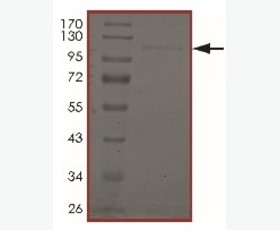Recombinant Mouse Lithostathine-2/Reg2
| Product name: | Recombinant Mouse Lithostathine-2/Reg2 |
| Source: | Human Cells |
| Purity: | Greater than 95% as determined by reducing SDS-PAGE. |
| Buffer Formulation: | Lyophilized from a 0.2 μm filtered solution of PBS pH7.4. |
| Applications: | Applications:SDS-PAGE; WB; ELISA; IP. |
| Storage: | Avoid repeated freeze/thaw cycles. Store at 2-8 oC for one month. Aliquot and store at -80 oC for 12 months. |
| UOM: | 100ug/50ug/200ug/1mg/1g |
| Source | Human Cells |
| Description | Recombinant Mouse Islets of Langerhans regenerating protein 2 is produced by our Mammalian expression system and the target gene encoding Gln23-Ala173 is expressed with a 6His tag at the N-terminus. |
| Names | Regenerating Islet-derived 2,Islet of Langerhans regenerating protein 2,Pancreatic stone protein 2,Pancreatic thread protein 2,PSP,PTP |
| Accession # | Q08731 |
| Formulation | Lyophilized from a 0.2 μm filtered solution of PBS pH7.4. |
| Shipping |
The product is shipped at ambient temperature. |
| Reconstitution |
Always centrifuge tubes before opening. Do not mix by vortex or pipetting. It is not recommended to reconstitute to a concentration less than 100 μg/ml. Dissolve the lyophilized protein in ddH2O. Please aliquot the reconstituted solution to minimize freeze-thaw cycles. |
| Storage |
Lyophilized protein should be stored at < -20°C, though stable at room temperature for 3 weeks. Reconstituted protein solution can be stored at 4-7°C for 2-7 days. Aliquots of reconstituted samples are stable at < -20°C for 3 months. |
| Purity |
Greater than 95% as determined by reducing SDS-PAGE. |
| Endotoxin | Less than 0.1 ng/µg (1 IEU/µg) as determined by LAL test. |
| Amino Acid Sequence |
HHHHHHQVAEEDFPLAEKDLPSAKINCPEGANAYGSYCYYLIEDRLTWGEADLFCQNMNAGHLVS ILSQAESNFVASLVKESGTTASNVWTGLHDPKSNRRWHWSSGSLFLFKSWATGAPSTANRGYCVS LTSNTAYKKWKDENCEAQYSFVCKFRA
|
| Background | Regenerating protein 2 (Reg2) also known as Lithostathine 2, pancreatic thread protein (PTP2) and pancreatic stone protein 2 (PSP2), is a member of the Reg family of proteins. These small, secreted proteins have been implicated in a range of physiological processes including acting as acute phase reactants, lectins, survival/growth factors for insulin-producing pancreatic beta-cells, neural cells, and epithelial cells of the digestive system. Studies also indicate a role for Reg family members in tumor formation and indicate their potential for use as biomarkers of carcinogenesis. Mouse Reg2 is expressed in regenerating islets and normal exocrine pancreas. Reg2 also stimulates the growth of pancreatic beta cells. Mouse Reg2 belongs to the type II subclass of the Reg family and is the only subclass II Reg protein described. |














